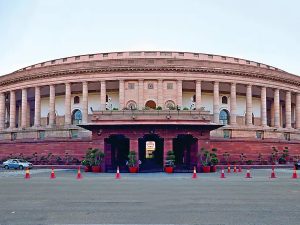
–By Dr Yugank Goyal, Associate Professor, Jindal School of Liberal Arts & Humanities
Eleven-year-old Santoshi Kumari died of starvation in Jharkhand’s Simdega district this month. Her ration card was not Aadhaar card-linked, preventing her from receiving any food ration from the Public Distribution System (PDS) for several weeks. Many of us cringed on reading the news. The resulting politicisation of the debate and the cacophony of who is at fault reminds us again of the hopelessness in public discourse.
A fresh, young mind has been left baffled by this. Why did the PDS dealer not give some food to a dying girl? How difficult can it be? An ‘old’ mind understands. If the paperwork isn’t right, what can the dealer do?
Thinking like a catalogue
Our society runs on paperwork. Bureaucracy came into being after the birth of scripts in ancient civilisation. When a large amount of administrative data was created, a system was needed to retrieve the stored knowledge, which gave rise to archiving, cataloguing and classifying. More than writing, it was this method of retrieval that led to efficiency. Archaeologists discover new scripts every decade, but what sets the Sumerians, Chinese and Egyptians apart were their investments in building ways of cataloguing, says historian Yuval Noah Harari in his book Sapiens.
In our brains, data are organised freely. In libraries, banks and offices, we need librarians, clerks and accountants to organise data. In time, this leads people to be reprogrammed to start thinking like machines, reading and retrieving data, rather than thinking like humans. Modern debates of objectivity make our obsession with paperwork even more brutal. Discretion and free thought are peripheral while forms and filing cabinets become central.
‘Cabinetisation’ of the world
All this took a strong hold rather late in history. With economies growing, this transformation was inevitable. In his book Cubed, Nikil Saval gives us a fascinating account of how all-purpose clerks, who ran most organisations in the U.S. until the late 19th century, were transformed under the spell of a specialisation drive, largely influenced by the ideas of Frederick Taylor. In his book, The Utopia of Rules: On Technology, Stupidity and the Secret Joys of Bureaucracy, David Graeber writes of how the bureaucracy encourages cultivating helpless stupidity in both state and people. Ken Loach’s recent film, I, Daniel Blake, tells a horrific tale of a helpless plumber trying in vain to work through the bureaucracy to get welfare benefits. The Taipei Biennial 2016 expressed how bureaucracies have informed the imagination.
As opaque pieces of paper with signatures and seals take hold of our world, pain becomes linear and voiceless. Yet, this has worked out rather efficiently in the West. Societies run by clocks, computer commands and as queues waiting for their numbers to be displayed on the board. Regardless of the horrors, the trading of emotions for the order and regularity of bureaucratic life has paid off in the rich countries. The question is this: why hasn’t it worked in poor societies? And how can it?
Bureaucracy is new in developing countries. And we must realise that institutionally, people are not “bureaucracy-receptive”. In his monograph, Danes Are Like That, anthropologist G. Prakash Reddy writes of his experience of living in a tiny Danish village called Hvilsager in the early 1990s. There, he was struck by the individuality and insularity of people’s lives. He writes: “Coming as I do from India, and born and brought up in a village, I am used to seeing people… The doors of all the houses were closed and created a doubt in me, as to whether this village had any people at all.”
The Indian villager accesses the state through a local leader. Everyone knows everyone else and independent bureaucracy cannot be executed in the web of interdependent informal relationships among the stakeholders. When the state creates a new bureaucratic framework that trumps local networks (on which informal societies such as India are built), citizens become confused and find themselves at a loss to negotiate their space. Here is an example. Many of our grandparents prefer to go to the bank rather than call customer care. Any new conduit of relationships makes them recede.
The traditional link
Societies carry a historical burden of norms and customs. Mostly informal in nature, these institutions cannot be changed overnight. New laws and regulations introduced in any society must recognise the informal social norms society is predicated upon. In societies such as India, citizen-state interaction is historically built on patronage and personal relations; bureaucratic forms of engagement are recent. The ‘modern’ forms of citizen-state engagement through the bureaucracy do not go well with ‘traditional’ citizens. Western societies that are individualised, are prepared to function bureaucratically, and can successfully build independent regulatory bodies. But collectivist societies like India cannot, and may be should not, try this. Therefore, shouldn’t we build a framework for emotional bureaucracies to emerge?
In diverse societies, bureaucracies have to be contextual, and therefore emotional. They must be designed for everyone, and not just for the urban elites. Regulations force people to change their behaviour and dynamics instantly. If the bureaucracy is not empathetic to those who are slow in responding, it will be hugely damaging to society as a whole. It will leave so many of us distressed, some of us dead, and even worse, most of us devoid of compassion.
(The article was originally published in The Hindu)

